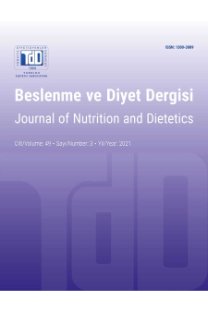Tip 1 Diyabetli Okul Öncesi Dönem Çocuklarda Yatmadan Önce Süt İçmenin Gece Glukoz Seyrine Etkisi: Vaka Sunumları
Impact of Milk as a Bedtime Snack on Nocturnal Glycemia in Preschool Children with Type 1 Diabetes: Case Series
___
- 1. Smart CE, Annan F, Higgins LA, Jelleryd E, Lopez M, Acerini CL. ISPAD Clinical Practice Consensus Guidelines 2018: Nutritional management in children and adolescents with diabetes. Pediatr Diabetes. 2018;19(Suppl 27):136-54.
- 2. Baechle C, Hoyer A, Castillo-Reinado K, Stahl-Pehe A, Kuss O, Holl RW, et al. Eating frequency and carbohydrate intake in adolescents with Type 1 diabetes differ from those in their peers and are associated with glycemic control. Exp Clin Endocrinol Diabetes. 2018;126(5):277- 86.
- 3. Danne T, Phillip M, Buckingham BA, Jarosz-Chobot P, Saboo B, Urakami T, et al. ISPAD Clinical Practice Consensus Guidelines 2018: Insulin treatment in children and adolescents with diabetes. Pediatr Diabetes. 2018;19(Suppl 27):115-35.
- 4. Kalergis M, Schiffrin A, Gougeon R, Jones PJ, Yale JF. Impact of bedtime snack composition on prevention of nocturnal hypoglycemia in adults with Type 1 diabetes undergoing intensive insulin management using lispro insulin before meals: A randomized, placebo-controlled, crossover trial. Diabetes Care. 2003;26(1):9-15.
- 5. Merwin RM, Moskovich AA, Honeycutt LK, Lane JD, Feinglos M, Surwit RS, et al. Time of day when Type 1 diabetes patients with eating disorder symptoms most commonly restrict insulin. Psychosom Med. 2018;80(2):222-9.
- 6. Vanderwel BW, Messer LH, Horton LA, McNair B, Cobry EC, McFann KK, et al. Missed insulin boluses for snacks in youth with type 1 diabetes. Diabetes Care. 2010;33(3):507-8.
- 7. Overby NC, Margeirsdottir HD, Brunborg C, Andersen LF, Dahl-Jørgensen K. The influence of dietary intake and meal pattern on blood glucose control in children and adolescents using intensive insulin treatment. Diabetologia. 2007;50(10):2044-51.
- 8. Sundberg F, Barnard K, Cato A, de Beaufort C, DiMeglio LA, Dooley G, et al. ISPAD Guidelines. Managing diabetes in preschool children. Pediatr Diabetes. 2017;18(7):499- 517.
- 9. Battelino T, Danne T, Bergenstal RM, Amiel SA, Beck R, Biester T, et al. Clinical targets for continuous glucose monitoring data interpretation: Recommendations from the international consensus on time in range. Diabetes Care. 2019;42(8):1593-603.
- 10. Phelan H, King B, Anderson D, Crock P, Lopez P, Smart C. Young children with Type 1 diabetes can achieve glycemic targets without hypoglycemia: Results of a novel intensive diabetes management program. Pediatr Diabetes. 2018;19(4):769-75.
- 11. Parillo M, Annuzzi G, Rivellese AA, Bozzetto L, Alessandrini R, Riccardi G, et al. Effects of meals with different glycaemic index on postprandial blood glucose response in patients with Type 1 diabetes treated with continuous subcutaneous insulin infusion. Diabet Med. 2011;28(2):227-9.
- 12. Atkinson FS, Foster-Powell K, Brand-Miller JC. International tables of glycemic index and glycemic load values: 2008. Diabetes Care. 2008;31(12):2281-3.
- 13. Merdol T. Temel Beslenme ve Diyetetik. Ankara: Güneş Tıp Kitabevi; 2015. s. 122-125.
- 14. T.C. Tarım ve Orman Bakanlığı. Ulusal Gıda Kompozisyon Veri Tabanı. Erişim: http://www.turkomp.gov.tr/main Erişim Tarihi: 20 Ağustos 2020.
- 15. Baysal A. Beslenme. Ankara: Hatiboğlu Yayınevi; 2011. s. 300.
- 16. Smart CEM, King BR, Lopez PE. Insulin dosing for fat and protein: Is it time? Diabetes Care. 2020;43(1):13-5.
- 17. Smart CE, Evans M, O’Connell SM, McElduff P, Lopez PE, Jones TW, et al. Both dietary protein and fat increase postprandial glucose excursions in children with type 1 diabetes, and the effect is additive. Diabetes Care. 2013;36(12):3897-902.
- 18. Wilson DM, Calhoun PM, Maahs DM, Chase HP, Messer L, Buckingham BA, et al. Factors associated with nocturnal hypoglycemia in at-risk adolescents and young adults with type 1 diabetes. Diabetes Technol Ther. 2015;17(6):385-91.
- 19. Hermida RC, García L, Ayala DE. Circadian variation of growth hormone secretion in normal prepubertal children. Comparison to constitutional growth delay and growth hormone deficiency. J Endocrinol Invest. 1996;19(5):273-83.
- 20. Seckold R, Howley P, King BR, Bell K, Smith A, Smart CE. Dietary intake and eating patterns of young children with type 1 diabetes achieving glycemic targets. BMJ Open Diabetes Res Care. 2019;7(1):e000663.
- 21. Yale JF. Hypoglycemia. In: Evidenced-Based Diabetes Care. Gerstein HC, Haynes RB, editors. Canada: BC Decker; 2001. p. 380–95.
- 22. Vervoort G, Goldschmidt HM, van Doorn LG. Nocturnal blood glucose profiles in patients with type 1 diabetes mellitus on multiple (> or = 4) daily insulin injection regimens. Diabet Med. 1996;13(9):794-9.
- 23. Bergada I, Suissa S, Dufresne J, Schiffrin A. Severe hypoglycemia in IDDM children. Diabetes Care. 1989;12(4):239-44.
- 24. Desjardins K, Brazeau AS, Strychar I, Rabasa-Lhoret R. Are bedtime nutritional strategies effective in preventing nocturnal hypoglycaemia in patients with type 1 diabetes? Diabetes Obes Metab. 2014;16(7):577- 87.
- ISSN: 1300-3089
- Yayın Aralığı: 3
- Başlangıç: 1972
- Yayıncı: Türkiye Diyestisyenler Derneği
Akademisyenlerin Uyku Süresi ve Kalitesinin Beslenme Durumlarına Etkisi
Resveratrol ile Beslenmenin Farelerde Myogenin ve mTOR Düzeyleri Üzerine Etkisi
Yeşim Korkmaz KASAP, Gül KIZILTAN, Beril KÖSE, Serap Andaç ÖZTÜRK, Erkan YURTÇU, Didem BACANLI
Danışman Diyetisyen/Beslenme ve Diyet Uzmanı Olmanın Dayanılmaz Hafifliği
Obezitede Güncel Yaklaşımlar: Kahverengi Yağ Dokusu Transplantasyonu ve Vagal Sinir Blokajı
Kronik Böbrek Yetmezliğinde Antioksidan Vitaminlerin İnflamasyon ve Oksidatif Stres Üzerine Etkisi
Feray GENÇER, MAKBULE GEZMEN KARADAĞ
Organik Çay İnfüzyonlarının Toplam Antioksidan ve Oksidan Kapasitelerinin Değerlendirilmesi
Tuğba GÖKÇE, Gül YEŞİLTEPE MUTLU, Ecem CAN, Elif EVİZ, Serra MURADOĞLU, Şükrü HATUN
Yaşlılarda Bilişsel Fonksiyonun Korunması ile İlişkili Diyet Modelleri
